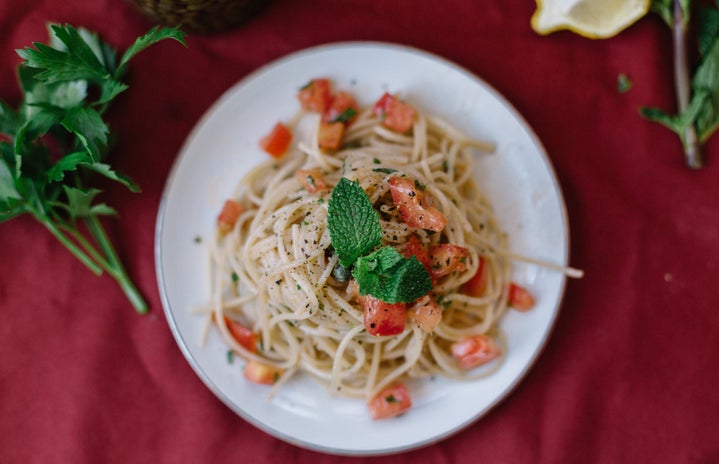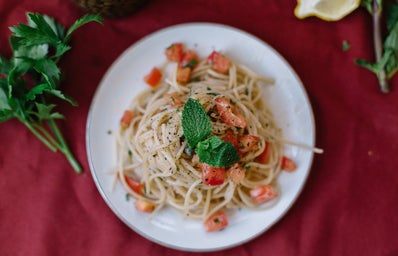Food is the bedrock of our personal and cultural identities. Growing up with an Italian-American mother, I always cherished the meals she cooks using her mother’s and grandmother’s recipes: stuffed shells, spaghetti with rich sauce, lasagna. Italian culture centers around food, and Italian food centers around gluten. So you can imagine my great disappointment when, two years ago, I had to cut gluten out of my diet for medical reasons. I suddenly felt alienated from my heritage.
Ironically, many people are allergic to foods that are intrinsic to their culture’s cuisine. Divira Pahwa, a junior at Michigan State University studying vocal performance, has been allergic to nuts and shellfish for her entire life, which prevents her from enjoying her family’s Indian cooking. She often feels isolated by this.
“I would go to functions like weddings or birthdays and would have to pack my own lunch because I couldn’t eat the catered food because everything would have nuts,” she told me. “When I would go to India, my mom would also have to make home cooked food and pack it for me.”
Yasmine Bolden, a freshman at Johns Hopkins University, also has life-threatening allergies to peanuts, tree nuts, and shellfish, which are staples in her family’s African American traditional foods. For her, family gatherings are “a painful reminder of the fact that there’s a part of my culture that I’ll never get to fully experience and that when I’m around, my family can’t fully partake in those traditions either.”
Food intolerances are on the rise: new diagnoses of celiac disease in the U.S. have increased by an average of 8% each year from 1950 to 2010, and peanut allergies in American children doubled from 1997 to 2002. So, what is causing our inability to eat so many foods? There is no singular explanation, but scientists have several theories. Allergies are an immune reaction, so susceptibility to them is linked to early childhood development of our immune systems. Environmental factors such as diet and exposure to microbes, pollution and mold all impact risk. For example, infants with high levels of hygiene (in other words, less exposure to microbes) are more prone to overactive immune responses later in life—such as allergies! Vitamin D exposure is also important for strong immune systems, but many groups—especially people of color—are prone to vitamin D deficiency.
Furthermore, there are higher rates of allergies in the Global North, and immigrants have a higher prevalence of food allergy in their adopted country than in their home country. This means that industrialization and urbanization may be to blame for the rise in food intolerances and allergies which disproportionately affect low and lower-middle income communities.
It isn’t only our own environment that impacts our risk for developing allergies: environmental exposures can be passed down generations through epigenetics (genomic information that sits “above” the DNA sequence and controls gene expression. If someone’s recent ancestors lacked sufficient nutrients, lived in polluted areas, or had decreased access to healthcare, their phenotype may also be altered. In this way, the impacts of systemic oppression can be genetically inherited, therefore disproportionately impacting people of color. In fact, Black children are more than twice as likely as white children to be sensitized to foods.
Bolden told me, “I’ve spent time recently thinking about the significance of the fact that the ideologies that enabled slavery have continued to take [from us] in ways we have yet to fully understand, even robbing some of us of the ability to live long lives of ease and fully partake in our cultures and traditions.”
Different traumatic historical events impact different groups. Tara Lamorgese, a junior at Lang College who has celiac, notes that the Irish side of her family has many stomach problems. “They believe that this predates the Irish famine,” she said, “In that, our abilities to digest food have been compromised as a result of a highly restrictive diet and malnourishment.”
However, we still find ways to enjoy our cultural food! “You try to adapt,” said John Accardi, the owner of Vito’s Slices and Ices pizzeria, who is from Italy and was recently diagnosed with celiac. Playing with different flour alternatives has felt like a “science experiment,” but he is satisfied with his wheat-free pizza dough. He is realizing that there is good demand for gluten-free pizza, and, like many restaurant owners, is revising his menu to add more gluten-free options. Since eliminating gluten in his diet, he has relied more on other foods that are naturally gluten-free. He also finds himself cooking more at home because it is difficult to find good quality, celiac friendly meals in restaurants.
Lamorgese is relieved that people and places are “a lot more accommodating now than they were when I was first diagnosed” thirteen years ago. Many grocery stores and restaurants offer gluten-free options that are sometimes even almost as yummy as real gluten (although unfortunately more expensive). In a pinch, there are often ‘safe foods’ like soups or salads offered at events. My family has discovered gluten-free pasta brands that we enjoy, such as Jovial and La Venezia, so that I can once again stuff myself with my mom’s spaghetti.
Dietary restrictions can even help bring families closer together. Bolden said, “I’m a firm believer in the idea that new traditions are always good (and even necessary)…there’s a lot of new inventions via ingredient substitutions or food revivals that happen because my existence necessitates new ways of cooking and practicing our culture.” While dietary challenges can still be frustrating and isolating, we can get creative and collaborate in new ways of appreciating our heritage.


